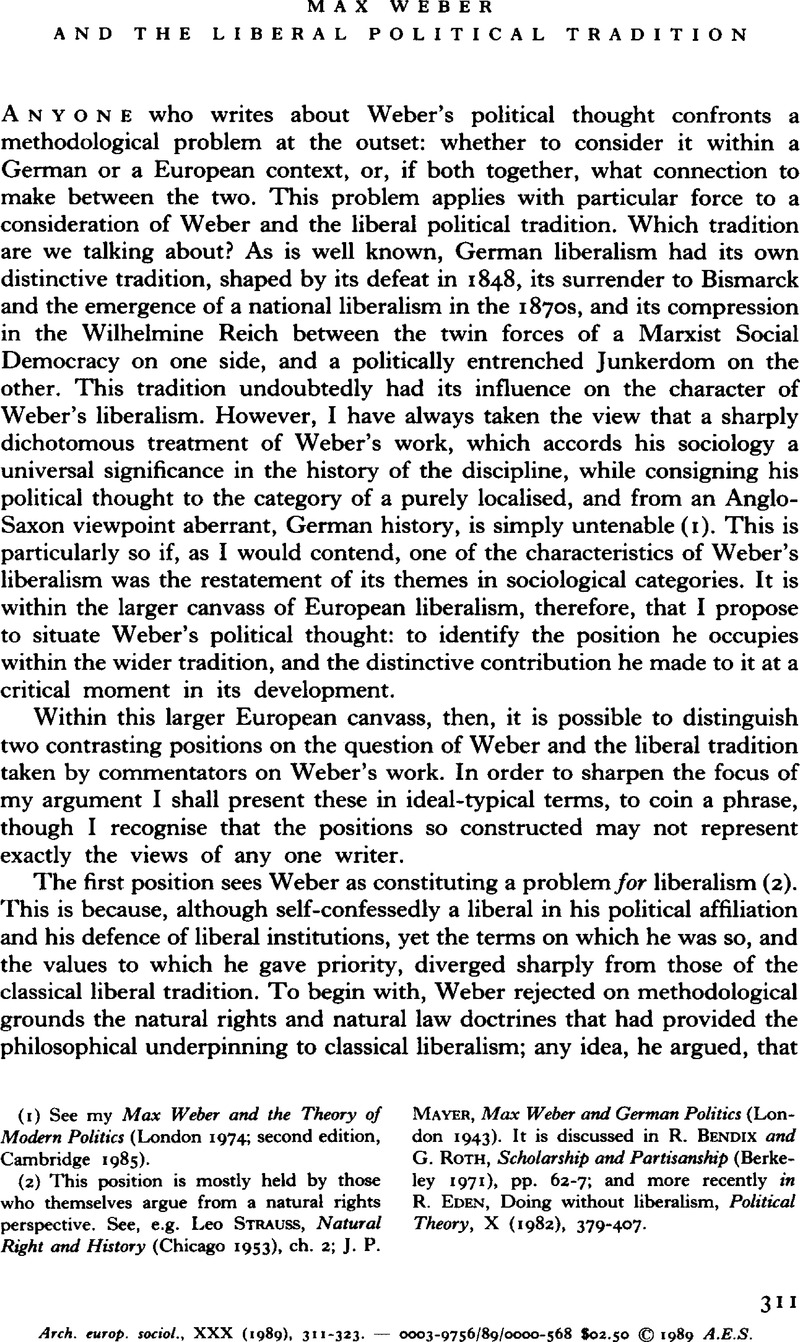Article contents
Max Weber and the liberal political tradition
Published online by Cambridge University Press: 28 July 2009
Abstract

- Type
- Notes Critiques
- Information
- European Journal of Sociology / Archives Européennes de Sociologie , Volume 30 , Issue 2 , November 1989 , pp. 311 - 323
- Copyright
- Copyright © Archives Européenes de Sociology 1989
References
(1) See my Max Weber and the Theory of Modern Politics (London 1974; second edition, Cambridge 1985)Google Scholar.
(2) This position is mostly held by those who themselves argue from a natural rights perspective. See, e.g. Strauss, Leo, Natural Right and History (Chicago 1953), ch. 2Google Scholar; Mayer, J. P., Max Weber and German Politics (London 1943)Google Scholar. It is discussed in Bendix, R. and Roth, G., Scholarship and Partisanship (Berkeley 1971), pp. 62–67Google Scholar; and more recently in Eden, R., Doing without liberalism, Political Theory, X (1982), 379–407.CrossRefGoogle Scholar
(3) For a more general argument about the effect of this tradition on German liberalism, see Hallowell, J. H., The Decline of Liberalism as an Ideology (London 1946).Google Scholar
(4) For accounts of the influence of Nietzsche on Weber, see Fleischmann, E., De Weber à Nietzsche, Archives européernnes de sociologie, V (1964), 190–238CrossRefGoogle Scholar; Eden, R., Weber and Nietzsche, in Mommsen, W. J. and Osterhammel, J. (eds.), Max Weber and his Contemporaries (London 1987), pp. 405–421.Google Scholar
(5) This is the position advanced, e.g. by Mommsen, Wolfgang in Max Weber und die Krise des liberalen Systems, Jahrbuch der Wittheit zu Bremen, XX (1976), 133–152Google Scholar; The Age of Bureaucracy (Oxford 1974), ch. v.Google ScholarPubMedMommsen, 's earlier work, Max Weber und die deutsche Politik, 1890–1920 (Tübingen 1959)Google Scholar, tended more towards the first position.
(6) Hobson, J. A., The Crisis of Liberalism (London 1909)Google Scholar (written as articles over the previous decade); see also his Imperialism: a study (London 1902)Google Scholar. For Hobhouse, L. T. see in particular Liberalism (London 1911)Google Scholar; Democracy and Reaction (London 1902).Google Scholar
(7) Hobson, J. A., The Crisis of Liberalism, p. 94.Google Scholar
(8) J. A. Hobson, Imperialism, esp. Pt. I, ch. vi, Pt. II, ch. 1.
(9) ‘The expression individualism includes the most heterogeneous things imaginable. What is here understood by it will, I hope, be clear from the following discussion: The Protestant Ethic and the Spirit of Capitalism (London 1930), p. 222Google ScholarPubMed, note 22. See pp. 105ff. for that ‘discussion’.
(10) M. Weber, op. cit. pp. 105, 112, etc.
(11) Ibid. pp. 119, 127, 154, etc.
(12) Ibid. p. 121.
(13) Gerth, H. H. and Mills, C. W., From Max Weber (London 1948), p. 320.Google Scholar
(14) Mill, J. S., On Representative Government (London, Everyman's Library, 1964).Google Scholar
(15) J. S. Mill, op. cit. p. 211.
(16) J. S. Mill, op. cit. p. 197.
(17) A. Ryan, Mill and Weber on history, freedom and reason, in W. J. Mommsen and J. Osterhammel, op. cit. esp. p. 117.
(18) Mill, J. S., On Liberty (London, Everyman's Library, 1964), p. 120.Google Scholar
(19) For a discussion of Weber's attitude to the Stephan George circle, see Weber, Marianne, Max Weber: a biography (New York 1975), pp. 455–467Google Scholar. For Weber and the Otto Gross circle, see W. Schwenntker, Passion as a mode of life, in W. J. Mommsen and J. Osterhammel, op. cit. pp. 483–98.
(20) M. Weber, op. cit. p. 178.
(21) D. Beetham, Max Weber and the Theory of Modern Politics, ch. 4.
(22) W. J. Mommsen, The Age of Bureaucracy, ch. IV; D. Beetham, op. cit. ch. 8.
- 13
- Cited by


